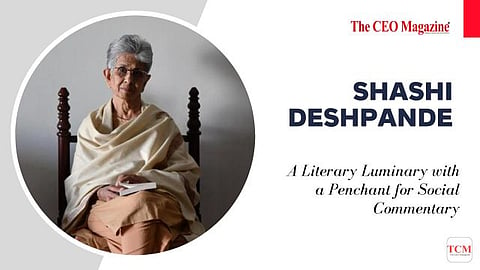
- News
- Women
- Magazine
- IndustryIndustry
- InsightsInsights
- Success Stories
- PublishPublish
- ContactContact
- Media KitMedia Kit

Shashi Deshpande
A Literary Luminary with a Penchant for Social Commentary
Shashi Deshpande, an acclaimed Indian novelist, is a distinguished figure in the realm of Indian literature. Her insightful writing style and profound narratives have made her a prominent voice, and her contributions have been recognised with prestigious awards, including the Sahitya Akademi Award and the Padma Shri. In this article, we explore the life, works, and social concerns embedded in Deshpande's literary journey.
Shashi Deshpande was born in Dharwad, Karnataka, in 1938. She was the second daughter of Adya Rangacharya, a renowned Kannada dramatist and writer, and Sharada Adya. Her early exposure to the world of literature and storytelling through her family laid the foundation for her future endeavours.
She received her education in Bombay (now Mumbai) and Bangalore and holds degrees in Economics and Law. Her academic pursuits took her to Mumbai, where she studied journalism at Vidya Bhavan and briefly worked as a journalist for the magazine 'Onlooker.'
Shashi Deshpande embarked on her literary journey with the publication of her first collection of short stories in 1978. Her first novel, 'The Dark Holds No Terror,' was published in 1980, marking the inception of a prolific writing career.
In 1990, her novel 'That Long Silence' earned her the prestigious Sahitya Akademi Award. Her contribution to Indian literature was further recognised in 2009 when she was honoured with the Padma Shri award for her outstanding literary achievements.
Deshpande's body of work spans various genres, including children's books, short stories, novels, and essays. Notable works include 'Roots and Shadows,' 'The Binding Vine,' 'Small Remedies,' and 'Shadow Play.' Her novel 'Shadow Play' was shortlisted for The Hindu Literary Prize in 2014, underscoring the depth of her storytelling.
In 2003, she released a thought-provoking collection of essays titled 'Writing from the Margin and Other Essays,' which showcases her perspective on literature and society.
Shashi Deshpande's literary repertoire is not only a reflection of her storytelling prowess but also a platform for raising critical social concerns. Her narratives often delve into the complexities of human relationships, societal norms, and the challenges faced by women.
Deshpande's writing is lauded for its ability to spark conversations about gender, identity, and the ever-evolving social fabric of India.
In 2015, Shashi Deshpande took a significant step in protest against the Sahitya Akademi's perceived inaction regarding the murder of M. M. Kalburgi. She resigned from her position in the Sahitya Akademi's general council and returned her Sahitya Akademi award, joining other writers in their collective stand for justice and freedom of expression.
During her inaugural address at the Goa Arts and Literature Festival (GALF) in 2018, Deshpande reminded the audience of the violence and suffering caused by the India-Pakistan partition. She urged Indians to reflect on the consequences of advocating for a Hindu nation, emphasising the need for tolerance, unity, and peace.
Shashi Deshpande's literary journey is a tapestry of captivating narratives, profound insights, and a resolute commitment to highlighting societal issues. Her ability to merge storytelling with social commentary has cemented her status as a prominent figure in Indian literature.
The Sahitya Akademi Award and the Padma Shri honour are a testament to the impact of her work. Shashi Deshpande's writings continue to captivate readers, offering thought-provoking narratives that bridge the realms of fiction and social consciousness.
Her fearless advocacy for justice and freedom of expression further reinforces her legacy as a literary luminary with a passion for addressing the issues that shape our world.
Follow us on Google News
